Cross-Cultural Negotiation: Perceptions and Strategic Frameworks
VerifiedAdded on 2022/10/10
|7
|1539
|76
Report
AI Summary
This report delves into the complexities of cross-cultural negotiation, focusing on how differing perceptions and cultural values influence the negotiation process. It provides two specific examples illustrating how cultural diversity impacts negotiation outcomes, exploring the contrasting approaches of countries like China and America, examining their preferences for win-win versus win-lose scenarios, and highlighting the importance of understanding decision-making authority. The report then analyzes how parties from different cultures can effectively negotiate using Weiss's strategic framework, emphasizing clear communication, mutual respect for cultural expectations, and a 'one-size-fits-all' approach to achieve mutually beneficial outcomes. The analysis underscores the significance of adapting negotiation strategies to accommodate cultural nuances for successful international business dealings.
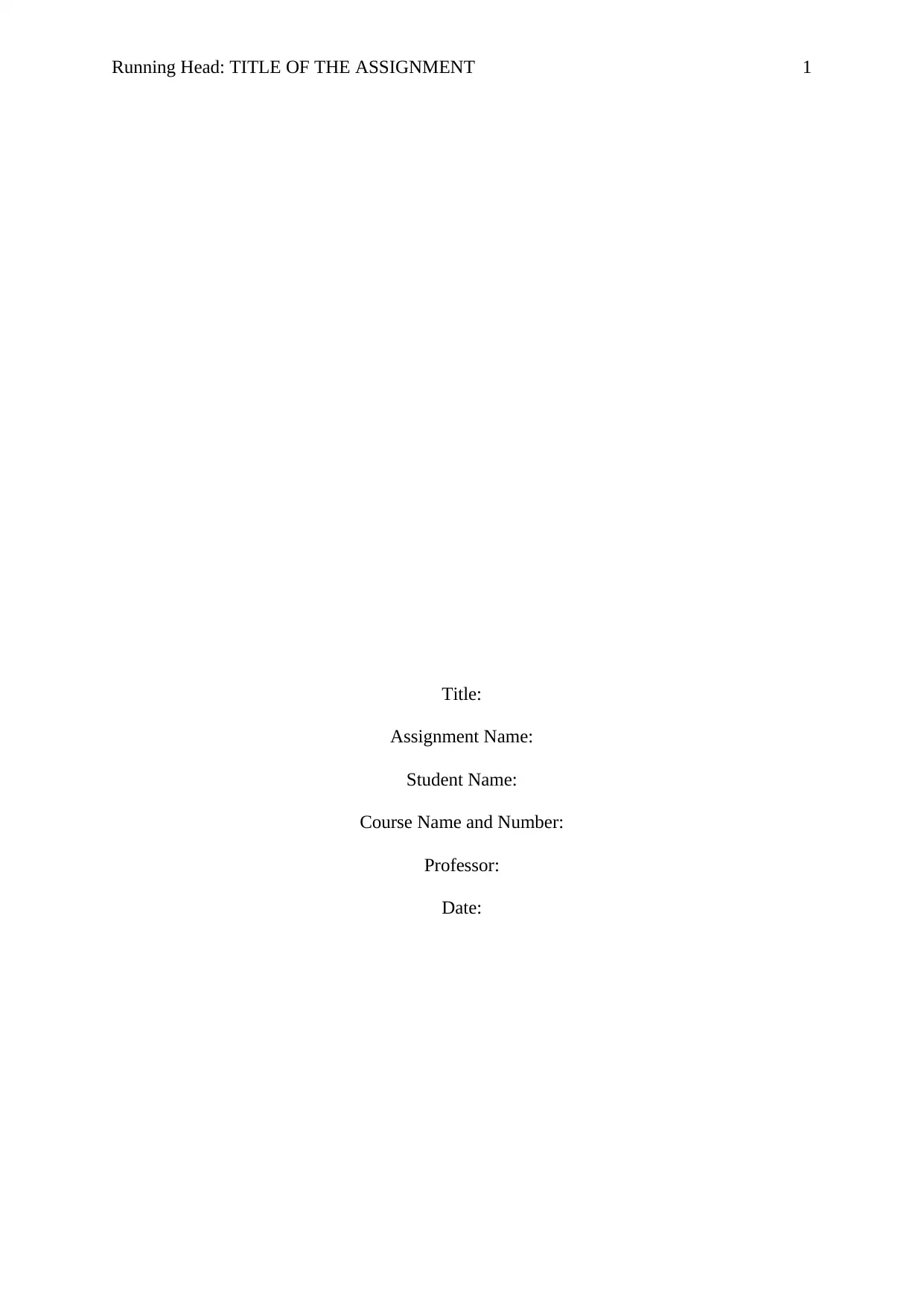
Running Head: TITLE OF THE ASSIGNMENT 1
Title:
Assignment Name:
Student Name:
Course Name and Number:
Professor:
Date:
Title:
Assignment Name:
Student Name:
Course Name and Number:
Professor:
Date:
Paraphrase This Document
Need a fresh take? Get an instant paraphrase of this document with our AI Paraphraser
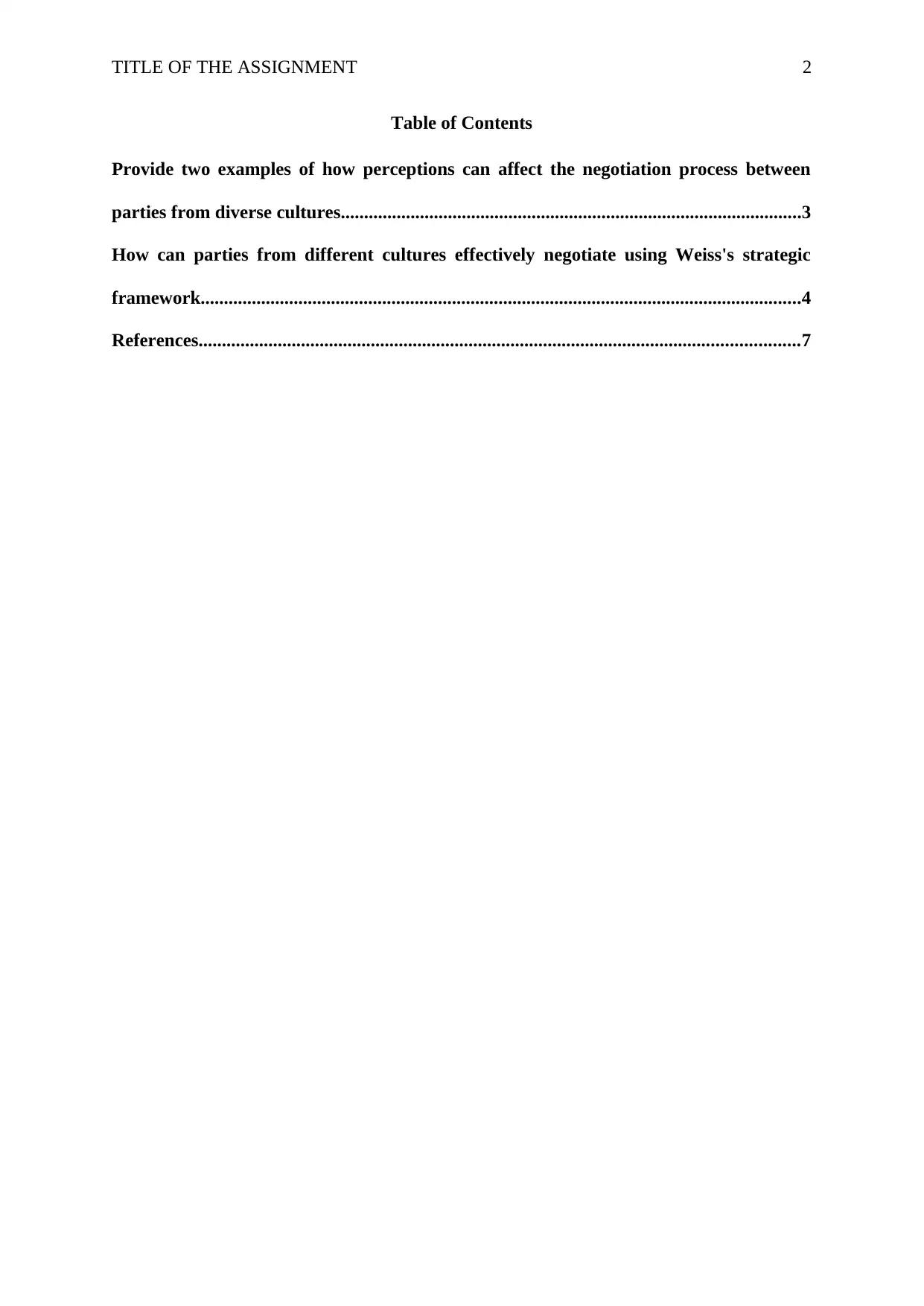
TITLE OF THE ASSIGNMENT 2
Table of Contents
Provide two examples of how perceptions can affect the negotiation process between
parties from diverse cultures...................................................................................................3
How can parties from different cultures effectively negotiate using Weiss's strategic
framework.................................................................................................................................4
References.................................................................................................................................7
Table of Contents
Provide two examples of how perceptions can affect the negotiation process between
parties from diverse cultures...................................................................................................3
How can parties from different cultures effectively negotiate using Weiss's strategic
framework.................................................................................................................................4
References.................................................................................................................................7
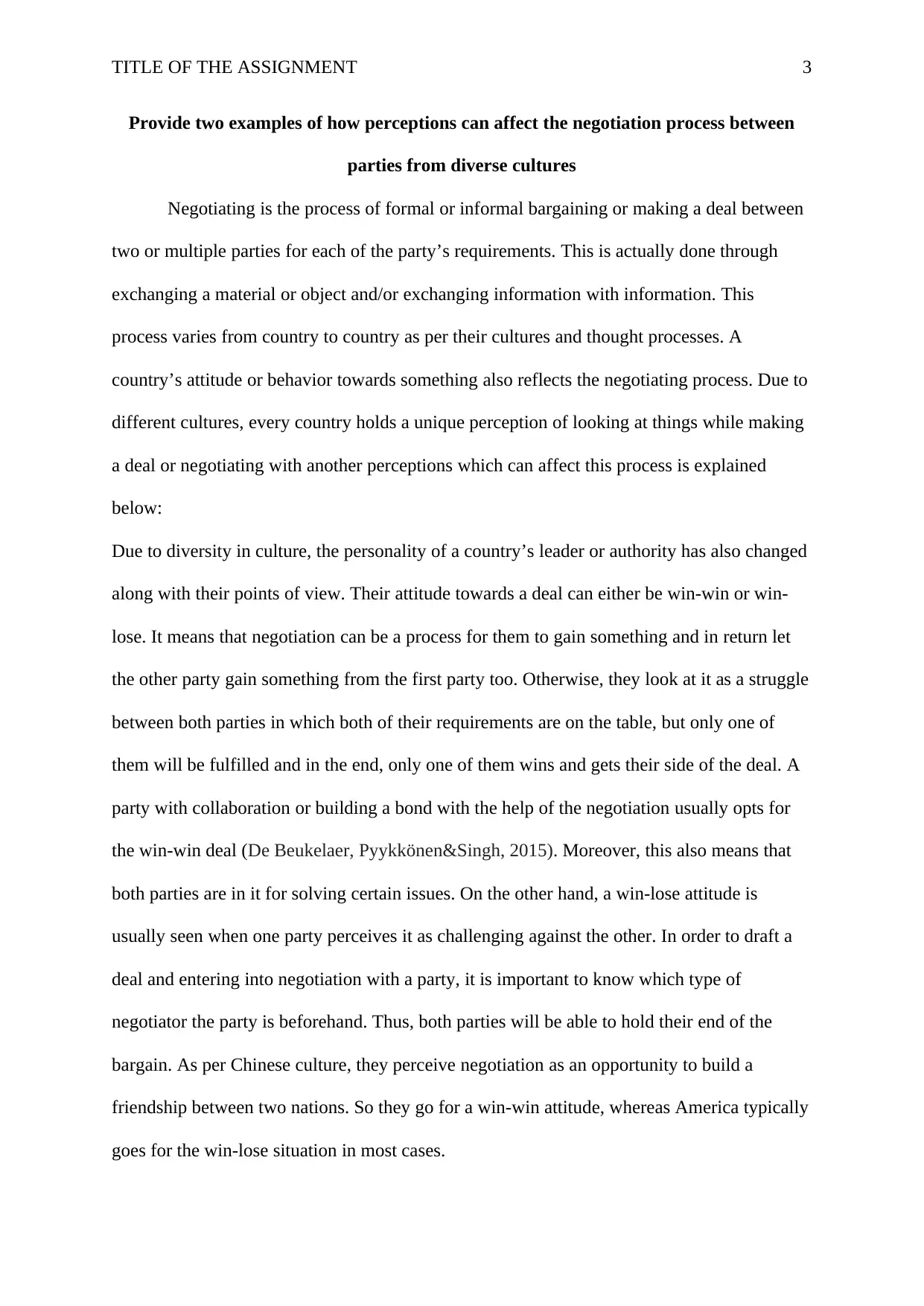
TITLE OF THE ASSIGNMENT 3
Provide two examples of how perceptions can affect the negotiation process between
parties from diverse cultures
Negotiating is the process of formal or informal bargaining or making a deal between
two or multiple parties for each of the party’s requirements. This is actually done through
exchanging a material or object and/or exchanging information with information. This
process varies from country to country as per their cultures and thought processes. A
country’s attitude or behavior towards something also reflects the negotiating process. Due to
different cultures, every country holds a unique perception of looking at things while making
a deal or negotiating with another perceptions which can affect this process is explained
below:
Due to diversity in culture, the personality of a country’s leader or authority has also changed
along with their points of view. Their attitude towards a deal can either be win-win or win-
lose. It means that negotiation can be a process for them to gain something and in return let
the other party gain something from the first party too. Otherwise, they look at it as a struggle
between both parties in which both of their requirements are on the table, but only one of
them will be fulfilled and in the end, only one of them wins and gets their side of the deal. A
party with collaboration or building a bond with the help of the negotiation usually opts for
the win-win deal (De Beukelaer, Pyykkönen&Singh, 2015). Moreover, this also means that
both parties are in it for solving certain issues. On the other hand, a win-lose attitude is
usually seen when one party perceives it as challenging against the other. In order to draft a
deal and entering into negotiation with a party, it is important to know which type of
negotiator the party is beforehand. Thus, both parties will be able to hold their end of the
bargain. As per Chinese culture, they perceive negotiation as an opportunity to build a
friendship between two nations. So they go for a win-win attitude, whereas America typically
goes for the win-lose situation in most cases.
Provide two examples of how perceptions can affect the negotiation process between
parties from diverse cultures
Negotiating is the process of formal or informal bargaining or making a deal between
two or multiple parties for each of the party’s requirements. This is actually done through
exchanging a material or object and/or exchanging information with information. This
process varies from country to country as per their cultures and thought processes. A
country’s attitude or behavior towards something also reflects the negotiating process. Due to
different cultures, every country holds a unique perception of looking at things while making
a deal or negotiating with another perceptions which can affect this process is explained
below:
Due to diversity in culture, the personality of a country’s leader or authority has also changed
along with their points of view. Their attitude towards a deal can either be win-win or win-
lose. It means that negotiation can be a process for them to gain something and in return let
the other party gain something from the first party too. Otherwise, they look at it as a struggle
between both parties in which both of their requirements are on the table, but only one of
them will be fulfilled and in the end, only one of them wins and gets their side of the deal. A
party with collaboration or building a bond with the help of the negotiation usually opts for
the win-win deal (De Beukelaer, Pyykkönen&Singh, 2015). Moreover, this also means that
both parties are in it for solving certain issues. On the other hand, a win-lose attitude is
usually seen when one party perceives it as challenging against the other. In order to draft a
deal and entering into negotiation with a party, it is important to know which type of
negotiator the party is beforehand. Thus, both parties will be able to hold their end of the
bargain. As per Chinese culture, they perceive negotiation as an opportunity to build a
friendship between two nations. So they go for a win-win attitude, whereas America typically
goes for the win-lose situation in most cases.
⊘ This is a preview!⊘
Do you want full access?
Subscribe today to unlock all pages.

Trusted by 1+ million students worldwide
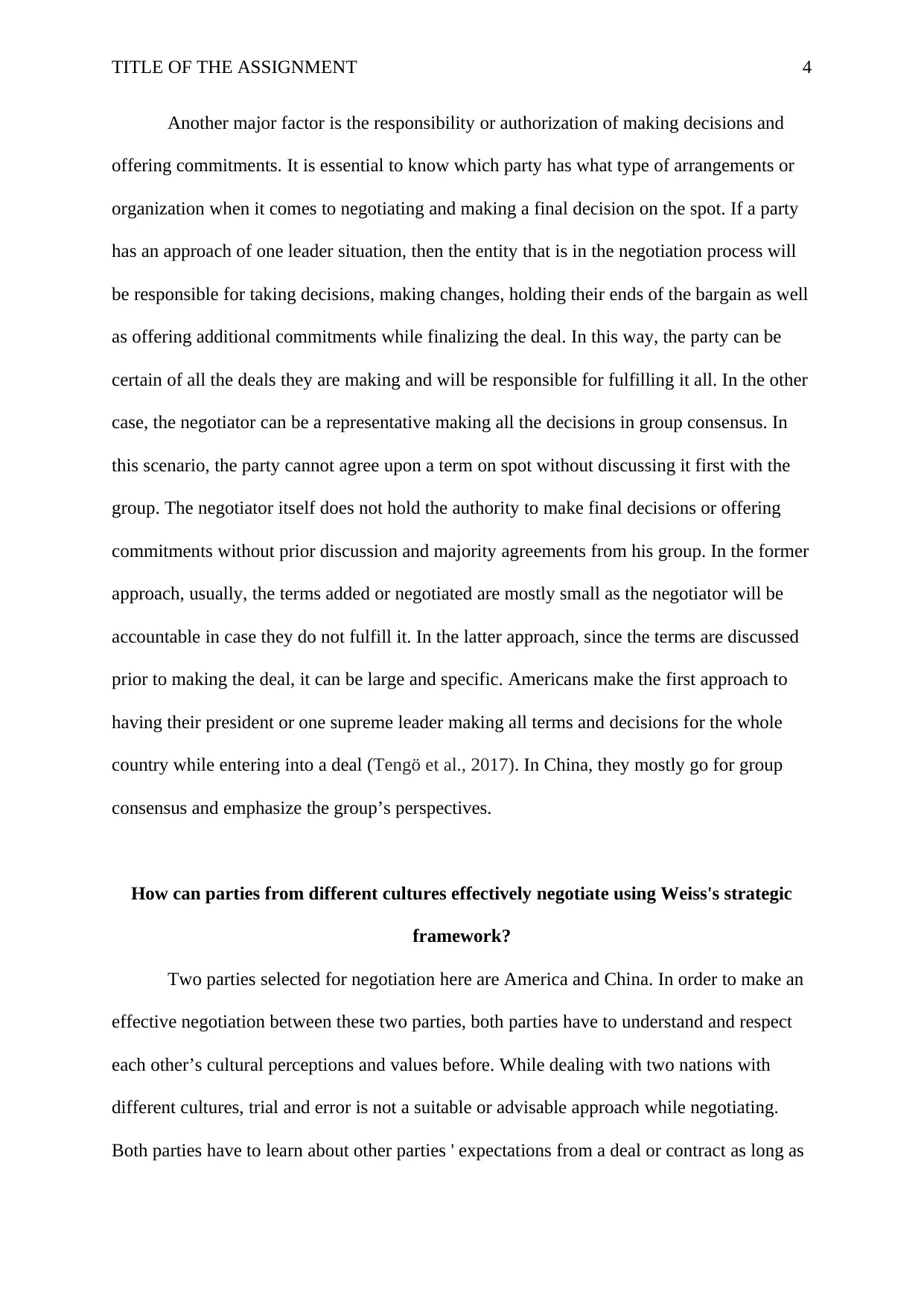
TITLE OF THE ASSIGNMENT 4
Another major factor is the responsibility or authorization of making decisions and
offering commitments. It is essential to know which party has what type of arrangements or
organization when it comes to negotiating and making a final decision on the spot. If a party
has an approach of one leader situation, then the entity that is in the negotiation process will
be responsible for taking decisions, making changes, holding their ends of the bargain as well
as offering additional commitments while finalizing the deal. In this way, the party can be
certain of all the deals they are making and will be responsible for fulfilling it all. In the other
case, the negotiator can be a representative making all the decisions in group consensus. In
this scenario, the party cannot agree upon a term on spot without discussing it first with the
group. The negotiator itself does not hold the authority to make final decisions or offering
commitments without prior discussion and majority agreements from his group. In the former
approach, usually, the terms added or negotiated are mostly small as the negotiator will be
accountable in case they do not fulfill it. In the latter approach, since the terms are discussed
prior to making the deal, it can be large and specific. Americans make the first approach to
having their president or one supreme leader making all terms and decisions for the whole
country while entering into a deal (Tengö et al., 2017). In China, they mostly go for group
consensus and emphasize the group’s perspectives.
How can parties from different cultures effectively negotiate using Weiss's strategic
framework?
Two parties selected for negotiation here are America and China. In order to make an
effective negotiation between these two parties, both parties have to understand and respect
each other’s cultural perceptions and values before. While dealing with two nations with
different cultures, trial and error is not a suitable or advisable approach while negotiating.
Both parties have to learn about other parties ' expectations from a deal or contract as long as
Another major factor is the responsibility or authorization of making decisions and
offering commitments. It is essential to know which party has what type of arrangements or
organization when it comes to negotiating and making a final decision on the spot. If a party
has an approach of one leader situation, then the entity that is in the negotiation process will
be responsible for taking decisions, making changes, holding their ends of the bargain as well
as offering additional commitments while finalizing the deal. In this way, the party can be
certain of all the deals they are making and will be responsible for fulfilling it all. In the other
case, the negotiator can be a representative making all the decisions in group consensus. In
this scenario, the party cannot agree upon a term on spot without discussing it first with the
group. The negotiator itself does not hold the authority to make final decisions or offering
commitments without prior discussion and majority agreements from his group. In the former
approach, usually, the terms added or negotiated are mostly small as the negotiator will be
accountable in case they do not fulfill it. In the latter approach, since the terms are discussed
prior to making the deal, it can be large and specific. Americans make the first approach to
having their president or one supreme leader making all terms and decisions for the whole
country while entering into a deal (Tengö et al., 2017). In China, they mostly go for group
consensus and emphasize the group’s perspectives.
How can parties from different cultures effectively negotiate using Weiss's strategic
framework?
Two parties selected for negotiation here are America and China. In order to make an
effective negotiation between these two parties, both parties have to understand and respect
each other’s cultural perceptions and values before. While dealing with two nations with
different cultures, trial and error is not a suitable or advisable approach while negotiating.
Both parties have to learn about other parties ' expectations from a deal or contract as long as
Paraphrase This Document
Need a fresh take? Get an instant paraphrase of this document with our AI Paraphraser
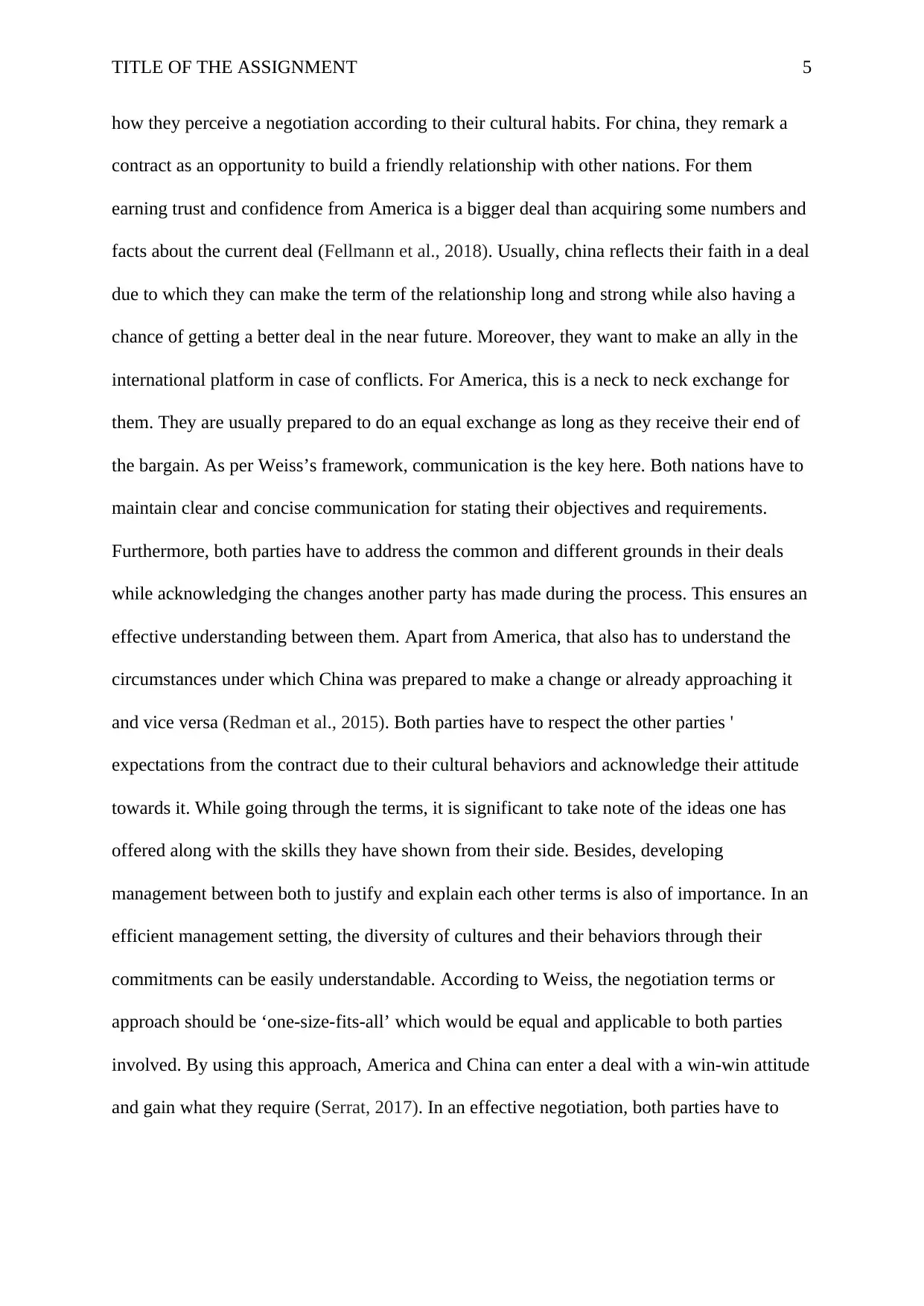
TITLE OF THE ASSIGNMENT 5
how they perceive a negotiation according to their cultural habits. For china, they remark a
contract as an opportunity to build a friendly relationship with other nations. For them
earning trust and confidence from America is a bigger deal than acquiring some numbers and
facts about the current deal (Fellmann et al., 2018). Usually, china reflects their faith in a deal
due to which they can make the term of the relationship long and strong while also having a
chance of getting a better deal in the near future. Moreover, they want to make an ally in the
international platform in case of conflicts. For America, this is a neck to neck exchange for
them. They are usually prepared to do an equal exchange as long as they receive their end of
the bargain. As per Weiss’s framework, communication is the key here. Both nations have to
maintain clear and concise communication for stating their objectives and requirements.
Furthermore, both parties have to address the common and different grounds in their deals
while acknowledging the changes another party has made during the process. This ensures an
effective understanding between them. Apart from America, that also has to understand the
circumstances under which China was prepared to make a change or already approaching it
and vice versa (Redman et al., 2015). Both parties have to respect the other parties '
expectations from the contract due to their cultural behaviors and acknowledge their attitude
towards it. While going through the terms, it is significant to take note of the ideas one has
offered along with the skills they have shown from their side. Besides, developing
management between both to justify and explain each other terms is also of importance. In an
efficient management setting, the diversity of cultures and their behaviors through their
commitments can be easily understandable. According to Weiss, the negotiation terms or
approach should be ‘one-size-fits-all’ which would be equal and applicable to both parties
involved. By using this approach, America and China can enter a deal with a win-win attitude
and gain what they require (Serrat, 2017). In an effective negotiation, both parties have to
how they perceive a negotiation according to their cultural habits. For china, they remark a
contract as an opportunity to build a friendly relationship with other nations. For them
earning trust and confidence from America is a bigger deal than acquiring some numbers and
facts about the current deal (Fellmann et al., 2018). Usually, china reflects their faith in a deal
due to which they can make the term of the relationship long and strong while also having a
chance of getting a better deal in the near future. Moreover, they want to make an ally in the
international platform in case of conflicts. For America, this is a neck to neck exchange for
them. They are usually prepared to do an equal exchange as long as they receive their end of
the bargain. As per Weiss’s framework, communication is the key here. Both nations have to
maintain clear and concise communication for stating their objectives and requirements.
Furthermore, both parties have to address the common and different grounds in their deals
while acknowledging the changes another party has made during the process. This ensures an
effective understanding between them. Apart from America, that also has to understand the
circumstances under which China was prepared to make a change or already approaching it
and vice versa (Redman et al., 2015). Both parties have to respect the other parties '
expectations from the contract due to their cultural behaviors and acknowledge their attitude
towards it. While going through the terms, it is significant to take note of the ideas one has
offered along with the skills they have shown from their side. Besides, developing
management between both to justify and explain each other terms is also of importance. In an
efficient management setting, the diversity of cultures and their behaviors through their
commitments can be easily understandable. According to Weiss, the negotiation terms or
approach should be ‘one-size-fits-all’ which would be equal and applicable to both parties
involved. By using this approach, America and China can enter a deal with a win-win attitude
and gain what they require (Serrat, 2017). In an effective negotiation, both parties have to

TITLE OF THE ASSIGNMENT 6
offer terms considering their abilities to fulfill it. Otherwise, the negotiation process will not
be successful and may end in a bitter term.
offer terms considering their abilities to fulfill it. Otherwise, the negotiation process will not
be successful and may end in a bitter term.
⊘ This is a preview!⊘
Do you want full access?
Subscribe today to unlock all pages.

Trusted by 1+ million students worldwide
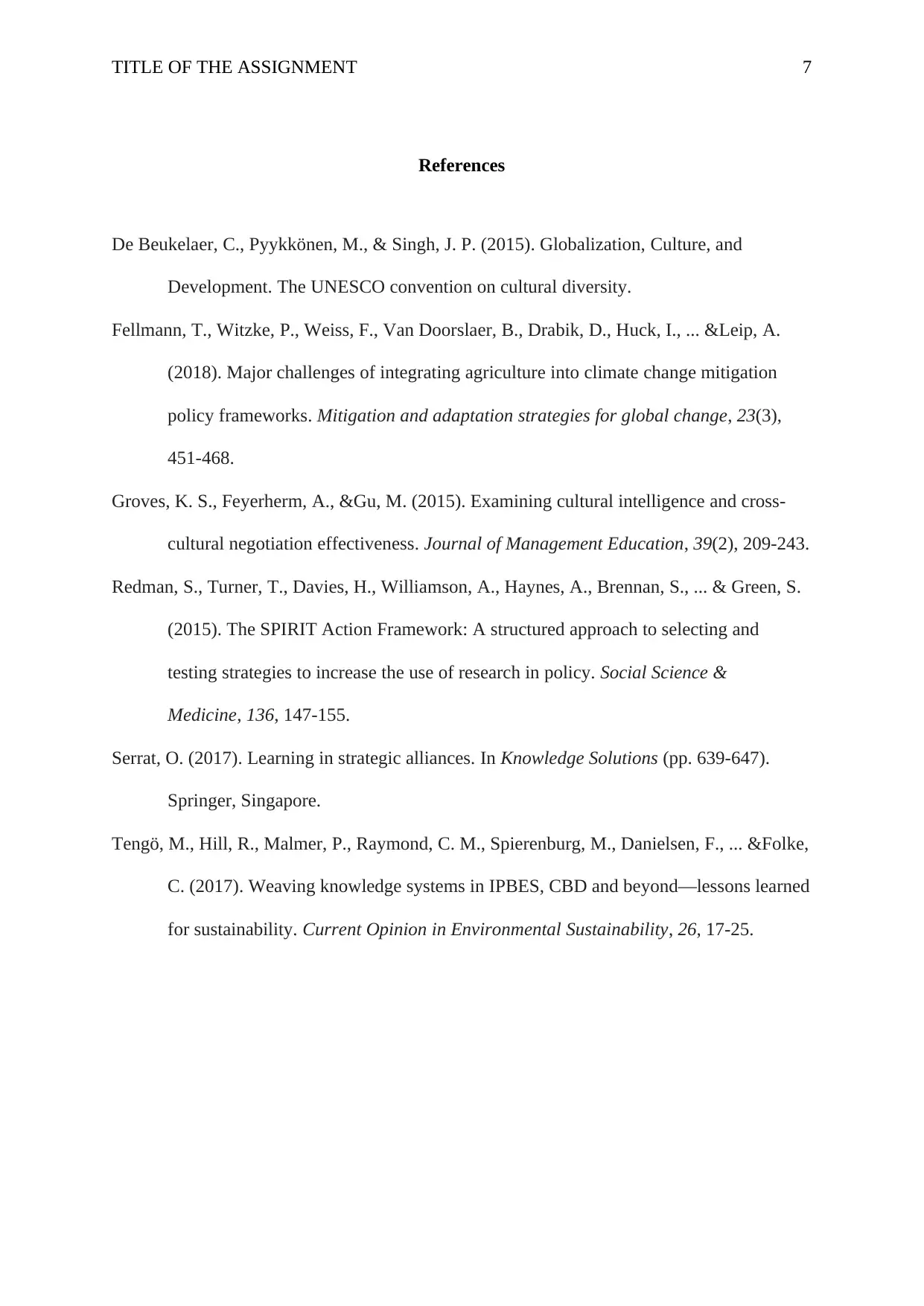
TITLE OF THE ASSIGNMENT 7
References
De Beukelaer, C., Pyykkönen, M., & Singh, J. P. (2015). Globalization, Culture, and
Development. The UNESCO convention on cultural diversity.
Fellmann, T., Witzke, P., Weiss, F., Van Doorslaer, B., Drabik, D., Huck, I., ... &Leip, A.
(2018). Major challenges of integrating agriculture into climate change mitigation
policy frameworks. Mitigation and adaptation strategies for global change, 23(3),
451-468.
Groves, K. S., Feyerherm, A., &Gu, M. (2015). Examining cultural intelligence and cross-
cultural negotiation effectiveness. Journal of Management Education, 39(2), 209-243.
Redman, S., Turner, T., Davies, H., Williamson, A., Haynes, A., Brennan, S., ... & Green, S.
(2015). The SPIRIT Action Framework: A structured approach to selecting and
testing strategies to increase the use of research in policy. Social Science &
Medicine, 136, 147-155.
Serrat, O. (2017). Learning in strategic alliances. In Knowledge Solutions (pp. 639-647).
Springer, Singapore.
Tengö, M., Hill, R., Malmer, P., Raymond, C. M., Spierenburg, M., Danielsen, F., ... &Folke,
C. (2017). Weaving knowledge systems in IPBES, CBD and beyond—lessons learned
for sustainability. Current Opinion in Environmental Sustainability, 26, 17-25.
References
De Beukelaer, C., Pyykkönen, M., & Singh, J. P. (2015). Globalization, Culture, and
Development. The UNESCO convention on cultural diversity.
Fellmann, T., Witzke, P., Weiss, F., Van Doorslaer, B., Drabik, D., Huck, I., ... &Leip, A.
(2018). Major challenges of integrating agriculture into climate change mitigation
policy frameworks. Mitigation and adaptation strategies for global change, 23(3),
451-468.
Groves, K. S., Feyerherm, A., &Gu, M. (2015). Examining cultural intelligence and cross-
cultural negotiation effectiveness. Journal of Management Education, 39(2), 209-243.
Redman, S., Turner, T., Davies, H., Williamson, A., Haynes, A., Brennan, S., ... & Green, S.
(2015). The SPIRIT Action Framework: A structured approach to selecting and
testing strategies to increase the use of research in policy. Social Science &
Medicine, 136, 147-155.
Serrat, O. (2017). Learning in strategic alliances. In Knowledge Solutions (pp. 639-647).
Springer, Singapore.
Tengö, M., Hill, R., Malmer, P., Raymond, C. M., Spierenburg, M., Danielsen, F., ... &Folke,
C. (2017). Weaving knowledge systems in IPBES, CBD and beyond—lessons learned
for sustainability. Current Opinion in Environmental Sustainability, 26, 17-25.
1 out of 7
Related Documents
Your All-in-One AI-Powered Toolkit for Academic Success.
+13062052269
info@desklib.com
Available 24*7 on WhatsApp / Email
![[object Object]](/_next/static/media/star-bottom.7253800d.svg)
Unlock your academic potential
Copyright © 2020–2026 A2Z Services. All Rights Reserved. Developed and managed by ZUCOL.




